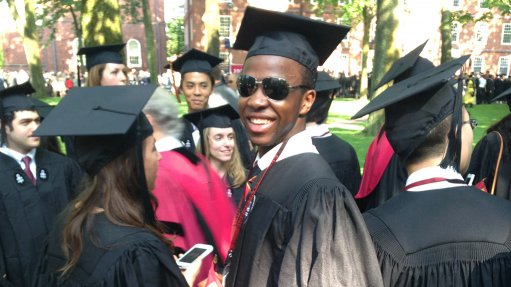
Harvard School of Engineering and Applied Sciences graduate Siyabulela Xuza has returned to South Africa to fill a gap in the skills space and participate in the nation’s energy revolution.
The Eastern Cape-born entrepreneur, who graduated from the world’s number-one university in May 2013 and had a minor planet named in his honour by the Massachusetts Institute of Technology (MIT) Lincoln Laboratory in 2008, aimed to develop Africa-specific energy solutions through the personalisation of energy.
“I was tempted to settle for a comfortable job in Silicon Valley but I decided to return to South Africa,” he said, adding that Africa, despite being open for business, needed a generation of skilled engineers to sustain and foster economic growth.
The young scientist, whose early rocket fuel project led to an invitation to the 2006 Nobel Prize Ceremonies in Sweden and scooped the 2007 Intel Science and Engineering Fair award, believed that the current traditional grid-tied model was not a long-term solution for Africa.
“I believe that everyone in the country, on the continent, all over the world has a very specific and quantifiable energy need … We don’t have a system that turns your home or small business into a personal power plant, and that has precluded the idea of personalisation,” he explained.
Xuza added: “From the beginning of the twentieth-century, you have had guys like Henry Ford who personalised transportation, Bill Gates who personalised computation, or even Steve Jobs who personalised music – really, the iPod is like your personal music station. No one has personalised energy yet.”
Xuza, who demonstrated a new type of fuel cell membrane design that could transform power sources for portable devices, had focused on the rising energy requirements of smartphones, which were placing constraints on the existing battery technologies, and the increasing need of telecommunications operators to expand into rural markets that had no electricity.
“Battery life is a growing problem to the ever-rising energy demands of today’s consumer electronic devices, particularly in advanced smartphones. Micro fuel cells offer a solution to the battery problem,” he said.
The proposed butane-fuelled fuel cells, which did not need to be connected to electricity to charge up, were developed at the Harvard Center for Nanoscale Systems and the MIT Microsystems Technology Laboratory.
“I did the project for my thesis and I demonstrated proof of concept. Cost reduction and financial feasibility is the next step,” Xuza said of the scalability-challenged and expensive technology.
The young scientist planned to fund the establishment of an African energy solutions company through the income generated from speaking engagements, such as sharing his story with the youth at schools and giving talks on innovation at companies, through a partnership with motivational company motiv8.
“I'm going to use this year to speak and to learn about the business of energy in Africa,” Xuza concluded.